BMP3003 Business Management: Academic Integrity, Misconduct & Game
VerifiedAdded on 2023/06/18
|9
|2658
|80
Report
AI Summary
This report provides a comprehensive overview of academic integrity within the context of business management, specifically for the Foundation BMP3003 course. It begins by defining academic integrity, emphasizing its value in higher education, and detailing the implications of academic misconduct, including plagiarism, collusion, falsification, and sabotage. The report then transitions to a reflection on the process of developing a game designed to educate students about academic misconduct, outlining the steps taken, challenges encountered, and skills acquired during the game's creation. Key skills highlighted include presentation, research, and writing, showcasing the practical application of theoretical knowledge in fostering ethical behavior within an academic environment. The report concludes by reinforcing the importance of academic integrity and its role in shaping responsible and ethical business professionals. Desklib provides access to similar solved assignments and resources for students.
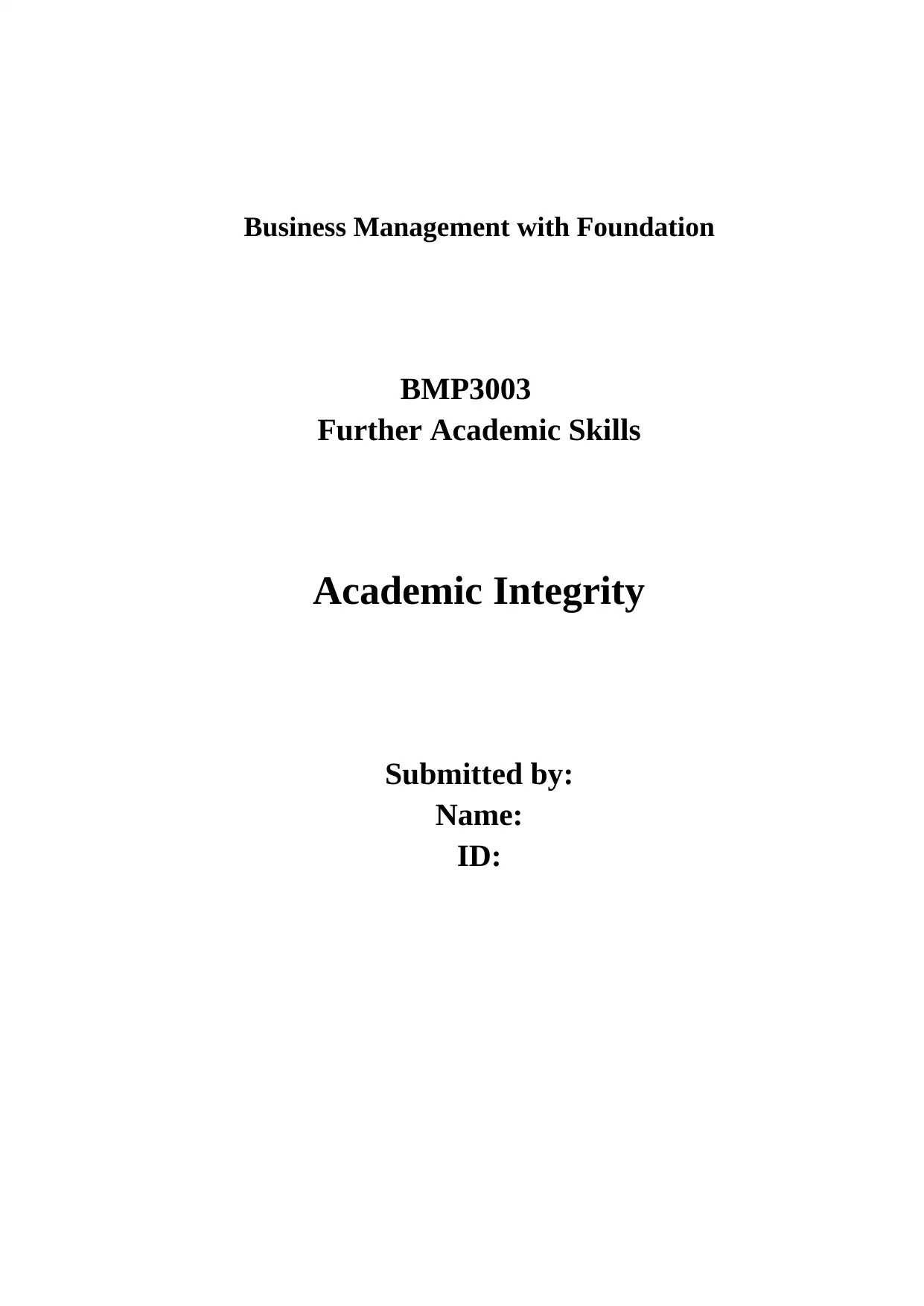
Business Management with Foundation
BMP3003
Further Academic Skills
Academic Integrity
Submitted by:
Name:
ID:
BMP3003
Further Academic Skills
Academic Integrity
Submitted by:
Name:
ID:
Paraphrase This Document
Need a fresh take? Get an instant paraphrase of this document with our AI Paraphraser
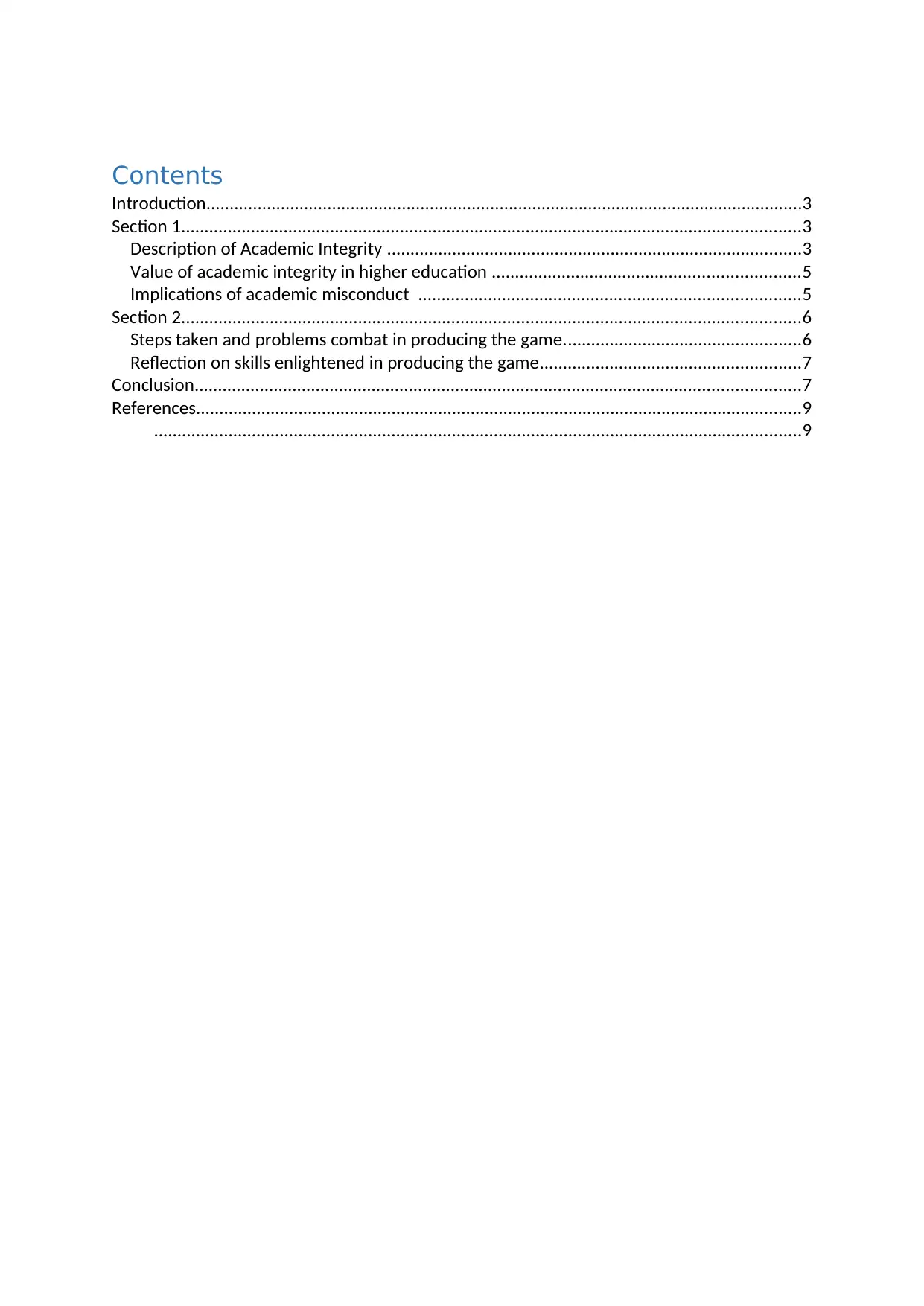
Contents
Introduction................................................................................................................................3
Section 1.....................................................................................................................................3
Description of Academic Integrity .........................................................................................3
Value of academic integrity in higher education ..................................................................5
Implications of academic misconduct ..................................................................................5
Section 2.....................................................................................................................................6
Steps taken and problems combat in producing the game...................................................6
Reflection on skills enlightened in producing the game........................................................7
Conclusion..................................................................................................................................7
References..................................................................................................................................9
...........................................................................................................................................9
Introduction................................................................................................................................3
Section 1.....................................................................................................................................3
Description of Academic Integrity .........................................................................................3
Value of academic integrity in higher education ..................................................................5
Implications of academic misconduct ..................................................................................5
Section 2.....................................................................................................................................6
Steps taken and problems combat in producing the game...................................................6
Reflection on skills enlightened in producing the game........................................................7
Conclusion..................................................................................................................................7
References..................................................................................................................................9
...........................................................................................................................................9
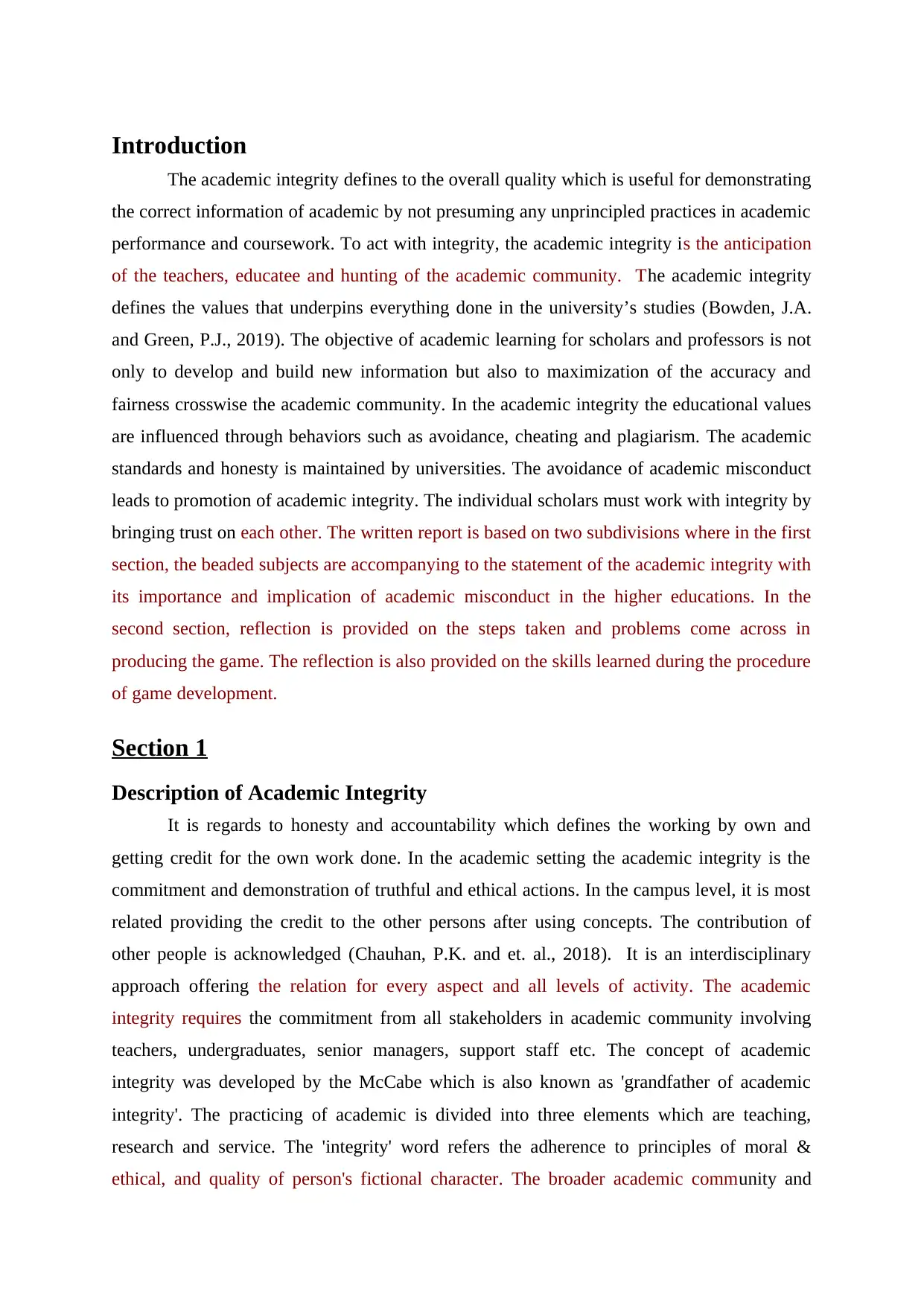
Introduction
The academic integrity defines to the overall quality which is useful for demonstrating
the correct information of academic by not presuming any unprincipled practices in academic
performance and coursework. To act with integrity, the academic integrity is the anticipation
of the teachers, educatee and hunting of the academic community. The academic integrity
defines the values that underpins everything done in the university’s studies (Bowden, J.A.
and Green, P.J., 2019). The objective of academic learning for scholars and professors is not
only to develop and build new information but also to maximization of the accuracy and
fairness crosswise the academic community. In the academic integrity the educational values
are influenced through behaviors such as avoidance, cheating and plagiarism. The academic
standards and honesty is maintained by universities. The avoidance of academic misconduct
leads to promotion of academic integrity. The individual scholars must work with integrity by
bringing trust on each other. The written report is based on two subdivisions where in the first
section, the beaded subjects are accompanying to the statement of the academic integrity with
its importance and implication of academic misconduct in the higher educations. In the
second section, reflection is provided on the steps taken and problems come across in
producing the game. The reflection is also provided on the skills learned during the procedure
of game development.
Section 1
Description of Academic Integrity
It is regards to honesty and accountability which defines the working by own and
getting credit for the own work done. In the academic setting the academic integrity is the
commitment and demonstration of truthful and ethical actions. In the campus level, it is most
related providing the credit to the other persons after using concepts. The contribution of
other people is acknowledged (Chauhan, P.K. and et. al., 2018). It is an interdisciplinary
approach offering the relation for every aspect and all levels of activity. The academic
integrity requires the commitment from all stakeholders in academic community involving
teachers, undergraduates, senior managers, support staff etc. The concept of academic
integrity was developed by the McCabe which is also known as 'grandfather of academic
integrity'. The practicing of academic is divided into three elements which are teaching,
research and service. The 'integrity' word refers the adherence to principles of moral &
ethical, and quality of person's fictional character. The broader academic community and
The academic integrity defines to the overall quality which is useful for demonstrating
the correct information of academic by not presuming any unprincipled practices in academic
performance and coursework. To act with integrity, the academic integrity is the anticipation
of the teachers, educatee and hunting of the academic community. The academic integrity
defines the values that underpins everything done in the university’s studies (Bowden, J.A.
and Green, P.J., 2019). The objective of academic learning for scholars and professors is not
only to develop and build new information but also to maximization of the accuracy and
fairness crosswise the academic community. In the academic integrity the educational values
are influenced through behaviors such as avoidance, cheating and plagiarism. The academic
standards and honesty is maintained by universities. The avoidance of academic misconduct
leads to promotion of academic integrity. The individual scholars must work with integrity by
bringing trust on each other. The written report is based on two subdivisions where in the first
section, the beaded subjects are accompanying to the statement of the academic integrity with
its importance and implication of academic misconduct in the higher educations. In the
second section, reflection is provided on the steps taken and problems come across in
producing the game. The reflection is also provided on the skills learned during the procedure
of game development.
Section 1
Description of Academic Integrity
It is regards to honesty and accountability which defines the working by own and
getting credit for the own work done. In the academic setting the academic integrity is the
commitment and demonstration of truthful and ethical actions. In the campus level, it is most
related providing the credit to the other persons after using concepts. The contribution of
other people is acknowledged (Chauhan, P.K. and et. al., 2018). It is an interdisciplinary
approach offering the relation for every aspect and all levels of activity. The academic
integrity requires the commitment from all stakeholders in academic community involving
teachers, undergraduates, senior managers, support staff etc. The concept of academic
integrity was developed by the McCabe which is also known as 'grandfather of academic
integrity'. The practicing of academic is divided into three elements which are teaching,
research and service. The 'integrity' word refers the adherence to principles of moral &
ethical, and quality of person's fictional character. The broader academic community and
⊘ This is a preview!⊘
Do you want full access?
Subscribe today to unlock all pages.

Trusted by 1+ million students worldwide
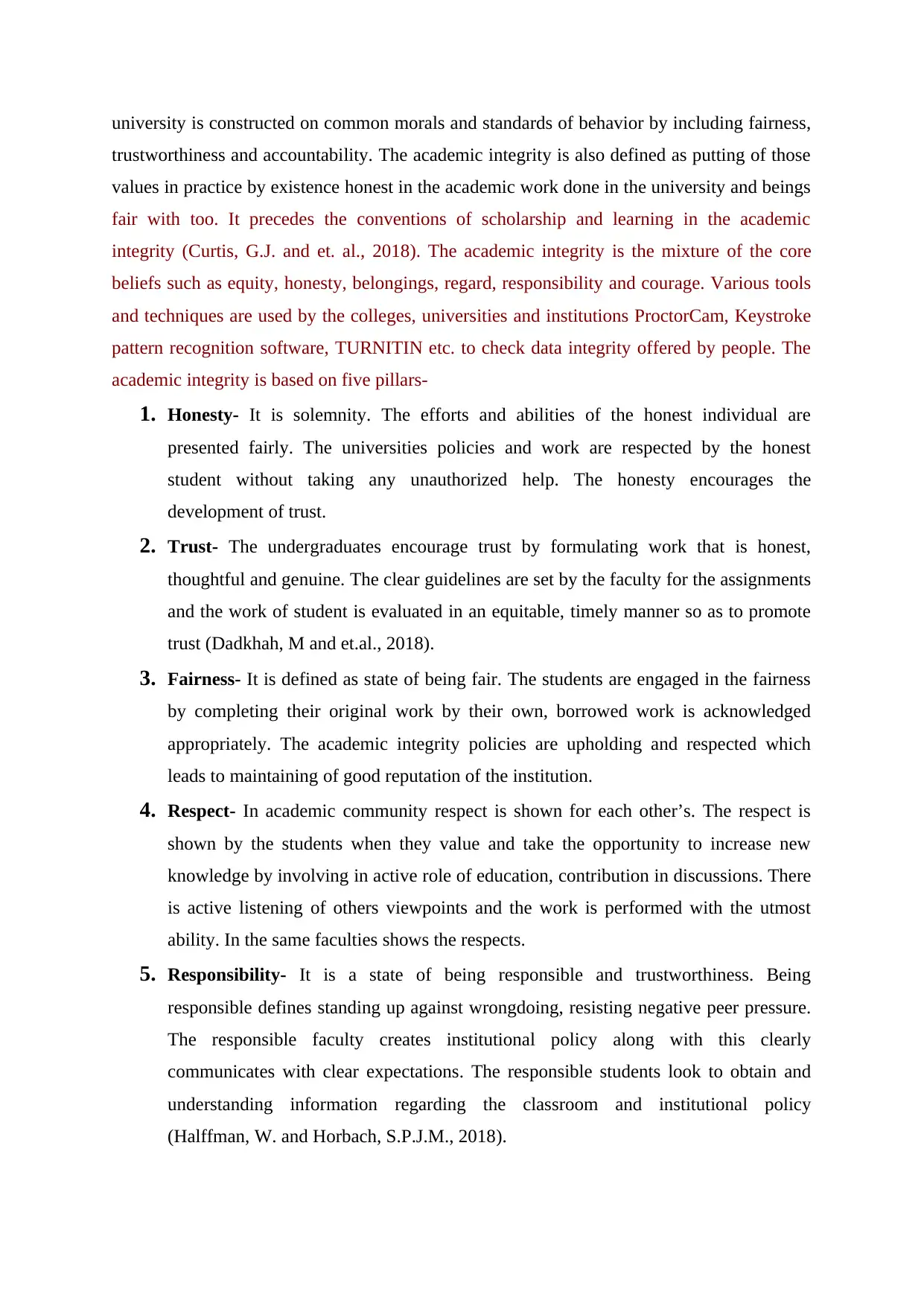
university is constructed on common morals and standards of behavior by including fairness,
trustworthiness and accountability. The academic integrity is also defined as putting of those
values in practice by existence honest in the academic work done in the university and beings
fair with too. It precedes the conventions of scholarship and learning in the academic
integrity (Curtis, G.J. and et. al., 2018). The academic integrity is the mixture of the core
beliefs such as equity, honesty, belongings, regard, responsibility and courage. Various tools
and techniques are used by the colleges, universities and institutions ProctorCam, Keystroke
pattern recognition software, TURNITIN etc. to check data integrity offered by people. The
academic integrity is based on five pillars-
1. Honesty- It is solemnity. The efforts and abilities of the honest individual are
presented fairly. The universities policies and work are respected by the honest
student without taking any unauthorized help. The honesty encourages the
development of trust.
2. Trust- The undergraduates encourage trust by formulating work that is honest,
thoughtful and genuine. The clear guidelines are set by the faculty for the assignments
and the work of student is evaluated in an equitable, timely manner so as to promote
trust (Dadkhah, M and et.al., 2018).
3. Fairness- It is defined as state of being fair. The students are engaged in the fairness
by completing their original work by their own, borrowed work is acknowledged
appropriately. The academic integrity policies are upholding and respected which
leads to maintaining of good reputation of the institution.
4. Respect- In academic community respect is shown for each other’s. The respect is
shown by the students when they value and take the opportunity to increase new
knowledge by involving in active role of education, contribution in discussions. There
is active listening of others viewpoints and the work is performed with the utmost
ability. In the same faculties shows the respects.
5. Responsibility- It is a state of being responsible and trustworthiness. Being
responsible defines standing up against wrongdoing, resisting negative peer pressure.
The responsible faculty creates institutional policy along with this clearly
communicates with clear expectations. The responsible students look to obtain and
understanding information regarding the classroom and institutional policy
(Halffman, W. and Horbach, S.P.J.M., 2018).
trustworthiness and accountability. The academic integrity is also defined as putting of those
values in practice by existence honest in the academic work done in the university and beings
fair with too. It precedes the conventions of scholarship and learning in the academic
integrity (Curtis, G.J. and et. al., 2018). The academic integrity is the mixture of the core
beliefs such as equity, honesty, belongings, regard, responsibility and courage. Various tools
and techniques are used by the colleges, universities and institutions ProctorCam, Keystroke
pattern recognition software, TURNITIN etc. to check data integrity offered by people. The
academic integrity is based on five pillars-
1. Honesty- It is solemnity. The efforts and abilities of the honest individual are
presented fairly. The universities policies and work are respected by the honest
student without taking any unauthorized help. The honesty encourages the
development of trust.
2. Trust- The undergraduates encourage trust by formulating work that is honest,
thoughtful and genuine. The clear guidelines are set by the faculty for the assignments
and the work of student is evaluated in an equitable, timely manner so as to promote
trust (Dadkhah, M and et.al., 2018).
3. Fairness- It is defined as state of being fair. The students are engaged in the fairness
by completing their original work by their own, borrowed work is acknowledged
appropriately. The academic integrity policies are upholding and respected which
leads to maintaining of good reputation of the institution.
4. Respect- In academic community respect is shown for each other’s. The respect is
shown by the students when they value and take the opportunity to increase new
knowledge by involving in active role of education, contribution in discussions. There
is active listening of others viewpoints and the work is performed with the utmost
ability. In the same faculties shows the respects.
5. Responsibility- It is a state of being responsible and trustworthiness. Being
responsible defines standing up against wrongdoing, resisting negative peer pressure.
The responsible faculty creates institutional policy along with this clearly
communicates with clear expectations. The responsible students look to obtain and
understanding information regarding the classroom and institutional policy
(Halffman, W. and Horbach, S.P.J.M., 2018).
Paraphrase This Document
Need a fresh take? Get an instant paraphrase of this document with our AI Paraphraser
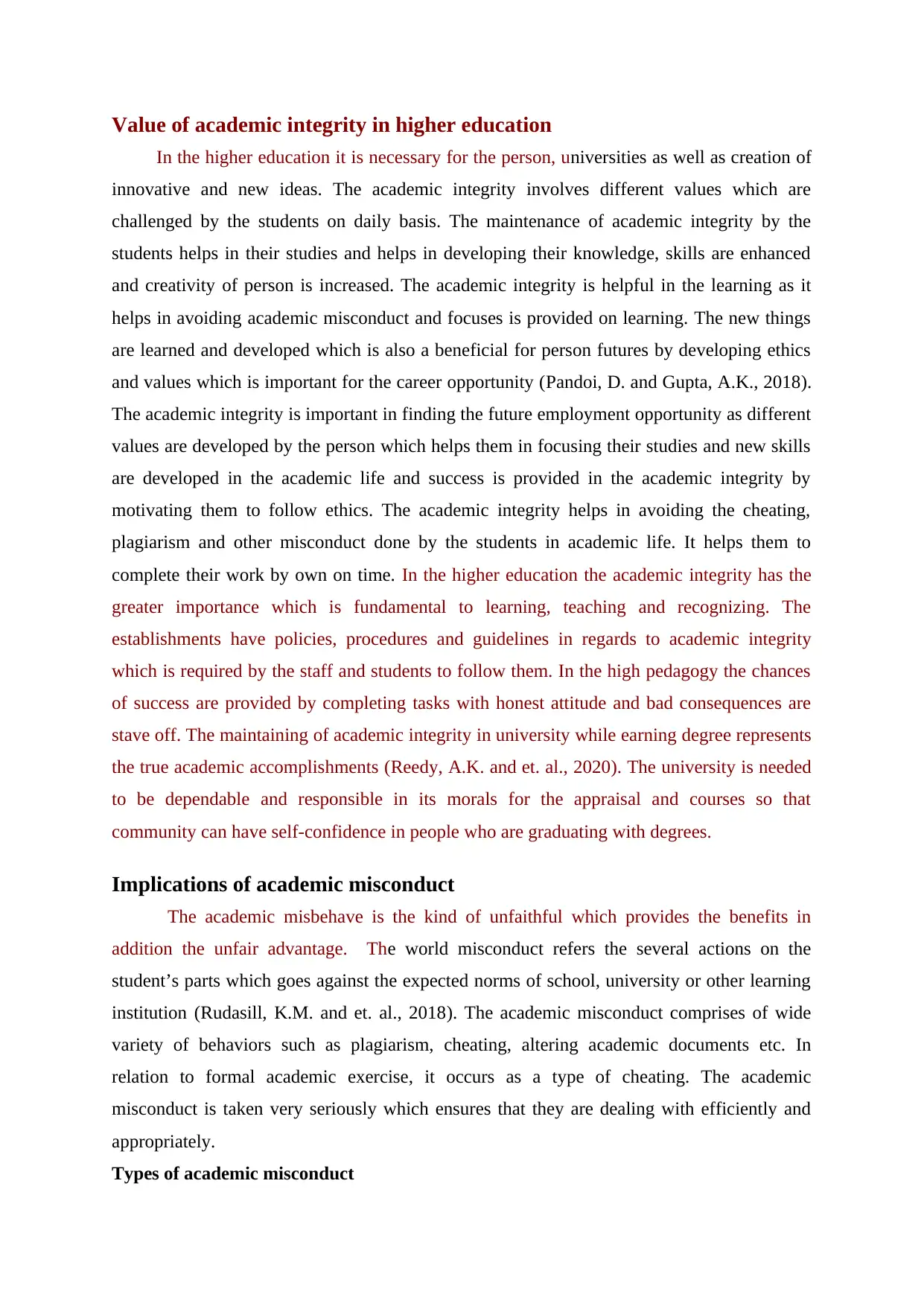
Value of academic integrity in higher education
In the higher education it is necessary for the person, universities as well as creation of
innovative and new ideas. The academic integrity involves different values which are
challenged by the students on daily basis. The maintenance of academic integrity by the
students helps in their studies and helps in developing their knowledge, skills are enhanced
and creativity of person is increased. The academic integrity is helpful in the learning as it
helps in avoiding academic misconduct and focuses is provided on learning. The new things
are learned and developed which is also a beneficial for person futures by developing ethics
and values which is important for the career opportunity (Pandoi, D. and Gupta, A.K., 2018).
The academic integrity is important in finding the future employment opportunity as different
values are developed by the person which helps them in focusing their studies and new skills
are developed in the academic life and success is provided in the academic integrity by
motivating them to follow ethics. The academic integrity helps in avoiding the cheating,
plagiarism and other misconduct done by the students in academic life. It helps them to
complete their work by own on time. In the higher education the academic integrity has the
greater importance which is fundamental to learning, teaching and recognizing. The
establishments have policies, procedures and guidelines in regards to academic integrity
which is required by the staff and students to follow them. In the high pedagogy the chances
of success are provided by completing tasks with honest attitude and bad consequences are
stave off. The maintaining of academic integrity in university while earning degree represents
the true academic accomplishments (Reedy, A.K. and et. al., 2020). The university is needed
to be dependable and responsible in its morals for the appraisal and courses so that
community can have self-confidence in people who are graduating with degrees.
Implications of academic misconduct
The academic misbehave is the kind of unfaithful which provides the benefits in
addition the unfair advantage. The world misconduct refers the several actions on the
student’s parts which goes against the expected norms of school, university or other learning
institution (Rudasill, K.M. and et. al., 2018). The academic misconduct comprises of wide
variety of behaviors such as plagiarism, cheating, altering academic documents etc. In
relation to formal academic exercise, it occurs as a type of cheating. The academic
misconduct is taken very seriously which ensures that they are dealing with efficiently and
appropriately.
Types of academic misconduct
In the higher education it is necessary for the person, universities as well as creation of
innovative and new ideas. The academic integrity involves different values which are
challenged by the students on daily basis. The maintenance of academic integrity by the
students helps in their studies and helps in developing their knowledge, skills are enhanced
and creativity of person is increased. The academic integrity is helpful in the learning as it
helps in avoiding academic misconduct and focuses is provided on learning. The new things
are learned and developed which is also a beneficial for person futures by developing ethics
and values which is important for the career opportunity (Pandoi, D. and Gupta, A.K., 2018).
The academic integrity is important in finding the future employment opportunity as different
values are developed by the person which helps them in focusing their studies and new skills
are developed in the academic life and success is provided in the academic integrity by
motivating them to follow ethics. The academic integrity helps in avoiding the cheating,
plagiarism and other misconduct done by the students in academic life. It helps them to
complete their work by own on time. In the higher education the academic integrity has the
greater importance which is fundamental to learning, teaching and recognizing. The
establishments have policies, procedures and guidelines in regards to academic integrity
which is required by the staff and students to follow them. In the high pedagogy the chances
of success are provided by completing tasks with honest attitude and bad consequences are
stave off. The maintaining of academic integrity in university while earning degree represents
the true academic accomplishments (Reedy, A.K. and et. al., 2020). The university is needed
to be dependable and responsible in its morals for the appraisal and courses so that
community can have self-confidence in people who are graduating with degrees.
Implications of academic misconduct
The academic misbehave is the kind of unfaithful which provides the benefits in
addition the unfair advantage. The world misconduct refers the several actions on the
student’s parts which goes against the expected norms of school, university or other learning
institution (Rudasill, K.M. and et. al., 2018). The academic misconduct comprises of wide
variety of behaviors such as plagiarism, cheating, altering academic documents etc. In
relation to formal academic exercise, it occurs as a type of cheating. The academic
misconduct is taken very seriously which ensures that they are dealing with efficiently and
appropriately.
Types of academic misconduct
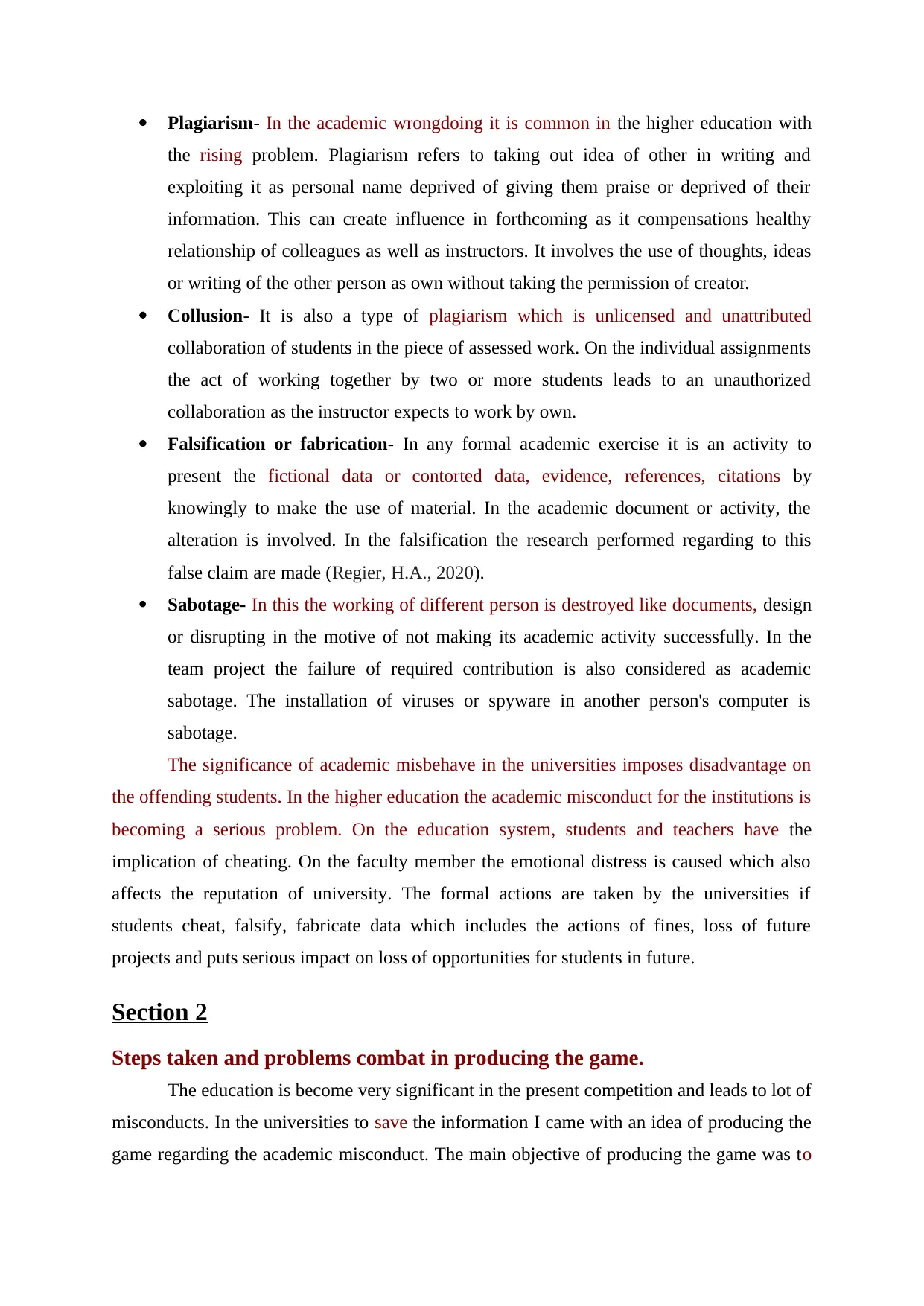
Plagiarism- In the academic wrongdoing it is common in the higher education with
the rising problem. Plagiarism refers to taking out idea of other in writing and
exploiting it as personal name deprived of giving them praise or deprived of their
information. This can create influence in forthcoming as it compensations healthy
relationship of colleagues as well as instructors. It involves the use of thoughts, ideas
or writing of the other person as own without taking the permission of creator.
Collusion- It is also a type of plagiarism which is unlicensed and unattributed
collaboration of students in the piece of assessed work. On the individual assignments
the act of working together by two or more students leads to an unauthorized
collaboration as the instructor expects to work by own.
Falsification or fabrication- In any formal academic exercise it is an activity to
present the fictional data or contorted data, evidence, references, citations by
knowingly to make the use of material. In the academic document or activity, the
alteration is involved. In the falsification the research performed regarding to this
false claim are made (Regier, H.A., 2020).
Sabotage- In this the working of different person is destroyed like documents, design
or disrupting in the motive of not making its academic activity successfully. In the
team project the failure of required contribution is also considered as academic
sabotage. The installation of viruses or spyware in another person's computer is
sabotage.
The significance of academic misbehave in the universities imposes disadvantage on
the offending students. In the higher education the academic misconduct for the institutions is
becoming a serious problem. On the education system, students and teachers have the
implication of cheating. On the faculty member the emotional distress is caused which also
affects the reputation of university. The formal actions are taken by the universities if
students cheat, falsify, fabricate data which includes the actions of fines, loss of future
projects and puts serious impact on loss of opportunities for students in future.
Section 2
Steps taken and problems combat in producing the game.
The education is become very significant in the present competition and leads to lot of
misconducts. In the universities to save the information I came with an idea of producing the
game regarding the academic misconduct. The main objective of producing the game was to
the rising problem. Plagiarism refers to taking out idea of other in writing and
exploiting it as personal name deprived of giving them praise or deprived of their
information. This can create influence in forthcoming as it compensations healthy
relationship of colleagues as well as instructors. It involves the use of thoughts, ideas
or writing of the other person as own without taking the permission of creator.
Collusion- It is also a type of plagiarism which is unlicensed and unattributed
collaboration of students in the piece of assessed work. On the individual assignments
the act of working together by two or more students leads to an unauthorized
collaboration as the instructor expects to work by own.
Falsification or fabrication- In any formal academic exercise it is an activity to
present the fictional data or contorted data, evidence, references, citations by
knowingly to make the use of material. In the academic document or activity, the
alteration is involved. In the falsification the research performed regarding to this
false claim are made (Regier, H.A., 2020).
Sabotage- In this the working of different person is destroyed like documents, design
or disrupting in the motive of not making its academic activity successfully. In the
team project the failure of required contribution is also considered as academic
sabotage. The installation of viruses or spyware in another person's computer is
sabotage.
The significance of academic misbehave in the universities imposes disadvantage on
the offending students. In the higher education the academic misconduct for the institutions is
becoming a serious problem. On the education system, students and teachers have the
implication of cheating. On the faculty member the emotional distress is caused which also
affects the reputation of university. The formal actions are taken by the universities if
students cheat, falsify, fabricate data which includes the actions of fines, loss of future
projects and puts serious impact on loss of opportunities for students in future.
Section 2
Steps taken and problems combat in producing the game.
The education is become very significant in the present competition and leads to lot of
misconducts. In the universities to save the information I came with an idea of producing the
game regarding the academic misconduct. The main objective of producing the game was to
⊘ This is a preview!⊘
Do you want full access?
Subscribe today to unlock all pages.

Trusted by 1+ million students worldwide
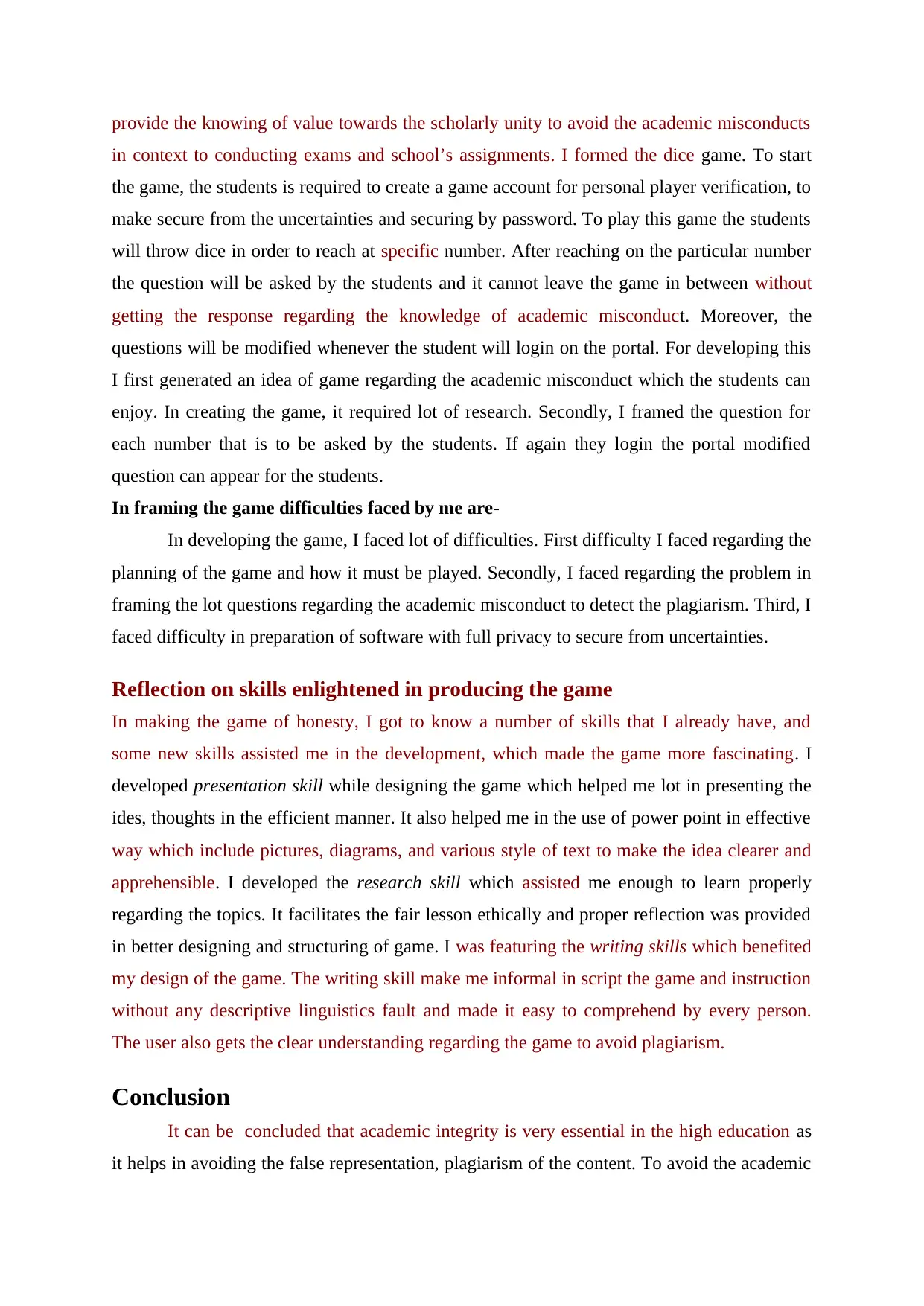
provide the knowing of value towards the scholarly unity to avoid the academic misconducts
in context to conducting exams and school’s assignments. I formed the dice game. To start
the game, the students is required to create a game account for personal player verification, to
make secure from the uncertainties and securing by password. To play this game the students
will throw dice in order to reach at specific number. After reaching on the particular number
the question will be asked by the students and it cannot leave the game in between without
getting the response regarding the knowledge of academic misconduct. Moreover, the
questions will be modified whenever the student will login on the portal. For developing this
I first generated an idea of game regarding the academic misconduct which the students can
enjoy. In creating the game, it required lot of research. Secondly, I framed the question for
each number that is to be asked by the students. If again they login the portal modified
question can appear for the students.
In framing the game difficulties faced by me are-
In developing the game, I faced lot of difficulties. First difficulty I faced regarding the
planning of the game and how it must be played. Secondly, I faced regarding the problem in
framing the lot questions regarding the academic misconduct to detect the plagiarism. Third, I
faced difficulty in preparation of software with full privacy to secure from uncertainties.
Reflection on skills enlightened in producing the game
In making the game of honesty, I got to know a number of skills that I already have, and
some new skills assisted me in the development, which made the game more fascinating. I
developed presentation skill while designing the game which helped me lot in presenting the
ides, thoughts in the efficient manner. It also helped me in the use of power point in effective
way which include pictures, diagrams, and various style of text to make the idea clearer and
apprehensible. I developed the research skill which assisted me enough to learn properly
regarding the topics. It facilitates the fair lesson ethically and proper reflection was provided
in better designing and structuring of game. I was featuring the writing skills which benefited
my design of the game. The writing skill make me informal in script the game and instruction
without any descriptive linguistics fault and made it easy to comprehend by every person.
The user also gets the clear understanding regarding the game to avoid plagiarism.
Conclusion
It can be concluded that academic integrity is very essential in the high education as
it helps in avoiding the false representation, plagiarism of the content. To avoid the academic
in context to conducting exams and school’s assignments. I formed the dice game. To start
the game, the students is required to create a game account for personal player verification, to
make secure from the uncertainties and securing by password. To play this game the students
will throw dice in order to reach at specific number. After reaching on the particular number
the question will be asked by the students and it cannot leave the game in between without
getting the response regarding the knowledge of academic misconduct. Moreover, the
questions will be modified whenever the student will login on the portal. For developing this
I first generated an idea of game regarding the academic misconduct which the students can
enjoy. In creating the game, it required lot of research. Secondly, I framed the question for
each number that is to be asked by the students. If again they login the portal modified
question can appear for the students.
In framing the game difficulties faced by me are-
In developing the game, I faced lot of difficulties. First difficulty I faced regarding the
planning of the game and how it must be played. Secondly, I faced regarding the problem in
framing the lot questions regarding the academic misconduct to detect the plagiarism. Third, I
faced difficulty in preparation of software with full privacy to secure from uncertainties.
Reflection on skills enlightened in producing the game
In making the game of honesty, I got to know a number of skills that I already have, and
some new skills assisted me in the development, which made the game more fascinating. I
developed presentation skill while designing the game which helped me lot in presenting the
ides, thoughts in the efficient manner. It also helped me in the use of power point in effective
way which include pictures, diagrams, and various style of text to make the idea clearer and
apprehensible. I developed the research skill which assisted me enough to learn properly
regarding the topics. It facilitates the fair lesson ethically and proper reflection was provided
in better designing and structuring of game. I was featuring the writing skills which benefited
my design of the game. The writing skill make me informal in script the game and instruction
without any descriptive linguistics fault and made it easy to comprehend by every person.
The user also gets the clear understanding regarding the game to avoid plagiarism.
Conclusion
It can be concluded that academic integrity is very essential in the high education as
it helps in avoiding the false representation, plagiarism of the content. To avoid the academic
Paraphrase This Document
Need a fresh take? Get an instant paraphrase of this document with our AI Paraphraser
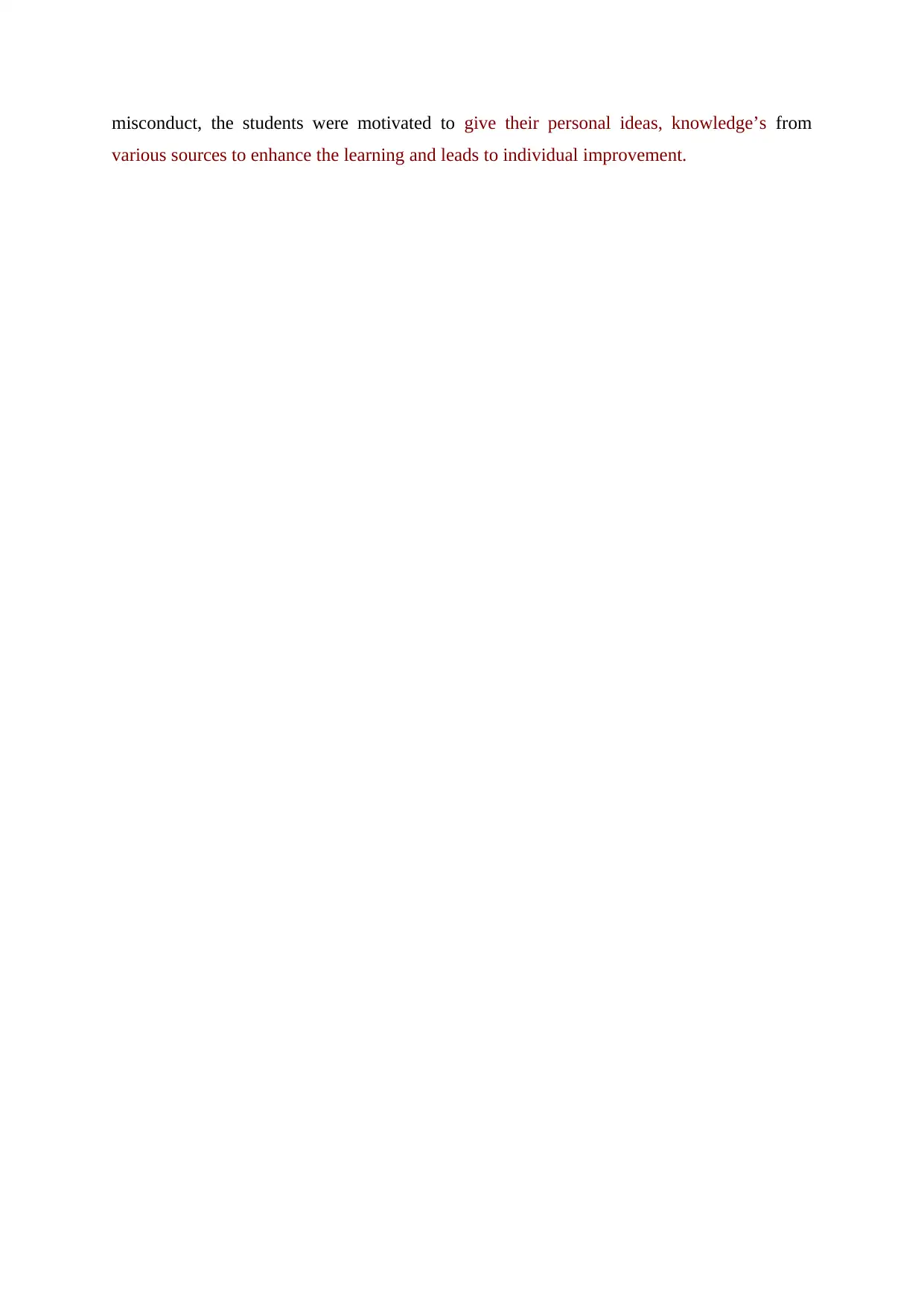
misconduct, the students were motivated to give their personal ideas, knowledge’s from
various sources to enhance the learning and leads to individual improvement.
various sources to enhance the learning and leads to individual improvement.
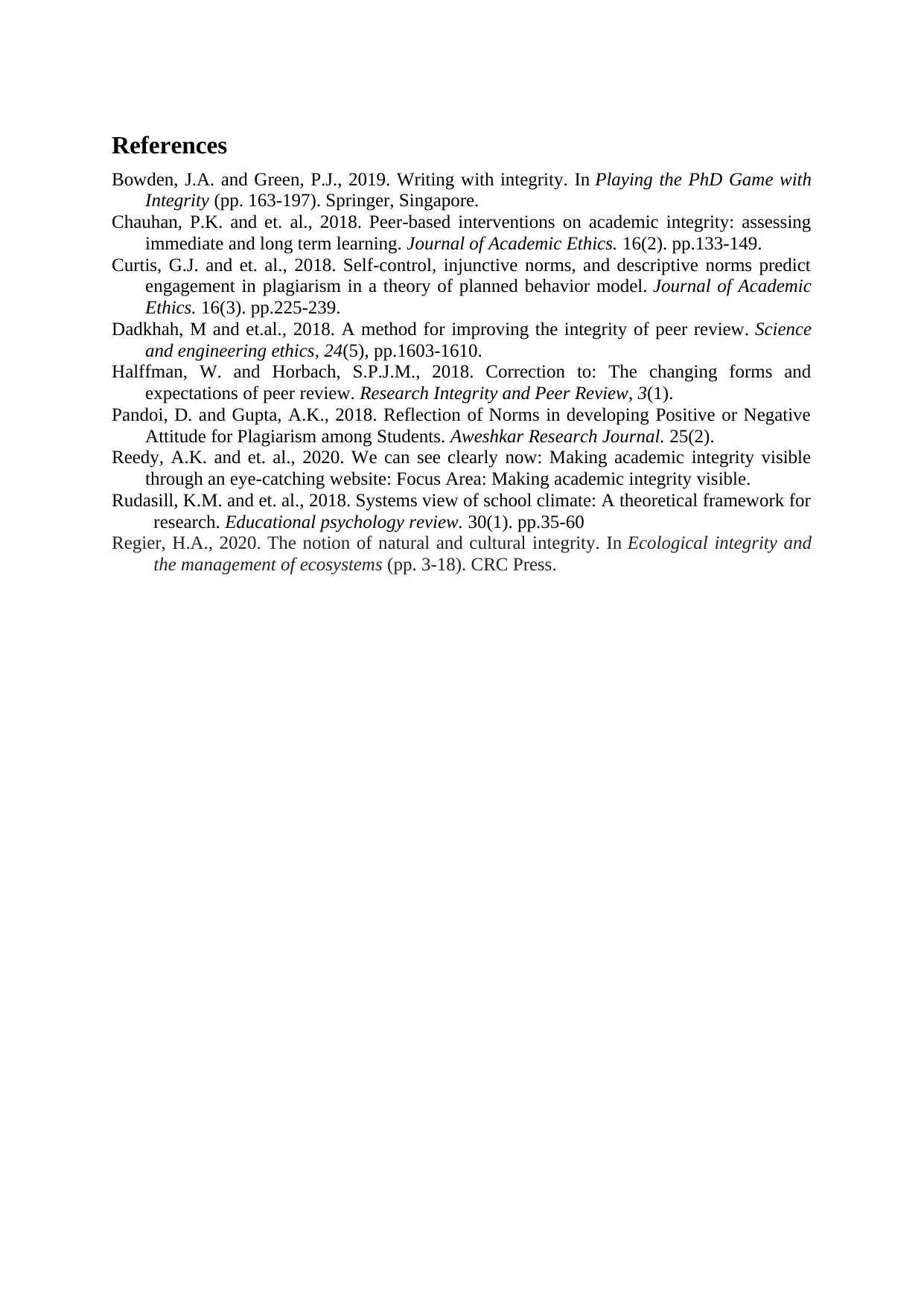
References
Bowden, J.A. and Green, P.J., 2019. Writing with integrity. In Playing the PhD Game with
Integrity (pp. 163-197). Springer, Singapore.
Chauhan, P.K. and et. al., 2018. Peer-based interventions on academic integrity: assessing
immediate and long term learning. Journal of Academic Ethics. 16(2). pp.133-149.
Curtis, G.J. and et. al., 2018. Self-control, injunctive norms, and descriptive norms predict
engagement in plagiarism in a theory of planned behavior model. Journal of Academic
Ethics. 16(3). pp.225-239.
Dadkhah, M and et.al., 2018. A method for improving the integrity of peer review. Science
and engineering ethics, 24(5), pp.1603-1610.
Halffman, W. and Horbach, S.P.J.M., 2018. Correction to: The changing forms and
expectations of peer review. Research Integrity and Peer Review, 3(1).
Pandoi, D. and Gupta, A.K., 2018. Reflection of Norms in developing Positive or Negative
Attitude for Plagiarism among Students. Aweshkar Research Journal. 25(2).
Reedy, A.K. and et. al., 2020. We can see clearly now: Making academic integrity visible
through an eye-catching website: Focus Area: Making academic integrity visible.
Rudasill, K.M. and et. al., 2018. Systems view of school climate: A theoretical framework for
research. Educational psychology review. 30(1). pp.35-60
Regier, H.A., 2020. The notion of natural and cultural integrity. In Ecological integrity and
the management of ecosystems (pp. 3-18). CRC Press.
Bowden, J.A. and Green, P.J., 2019. Writing with integrity. In Playing the PhD Game with
Integrity (pp. 163-197). Springer, Singapore.
Chauhan, P.K. and et. al., 2018. Peer-based interventions on academic integrity: assessing
immediate and long term learning. Journal of Academic Ethics. 16(2). pp.133-149.
Curtis, G.J. and et. al., 2018. Self-control, injunctive norms, and descriptive norms predict
engagement in plagiarism in a theory of planned behavior model. Journal of Academic
Ethics. 16(3). pp.225-239.
Dadkhah, M and et.al., 2018. A method for improving the integrity of peer review. Science
and engineering ethics, 24(5), pp.1603-1610.
Halffman, W. and Horbach, S.P.J.M., 2018. Correction to: The changing forms and
expectations of peer review. Research Integrity and Peer Review, 3(1).
Pandoi, D. and Gupta, A.K., 2018. Reflection of Norms in developing Positive or Negative
Attitude for Plagiarism among Students. Aweshkar Research Journal. 25(2).
Reedy, A.K. and et. al., 2020. We can see clearly now: Making academic integrity visible
through an eye-catching website: Focus Area: Making academic integrity visible.
Rudasill, K.M. and et. al., 2018. Systems view of school climate: A theoretical framework for
research. Educational psychology review. 30(1). pp.35-60
Regier, H.A., 2020. The notion of natural and cultural integrity. In Ecological integrity and
the management of ecosystems (pp. 3-18). CRC Press.
⊘ This is a preview!⊘
Do you want full access?
Subscribe today to unlock all pages.

Trusted by 1+ million students worldwide
1 out of 9
Related Documents
Your All-in-One AI-Powered Toolkit for Academic Success.
+13062052269
info@desklib.com
Available 24*7 on WhatsApp / Email
![[object Object]](/_next/static/media/star-bottom.7253800d.svg)
Unlock your academic potential
Copyright © 2020–2025 A2Z Services. All Rights Reserved. Developed and managed by ZUCOL.



